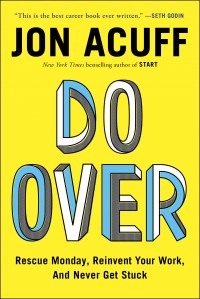
How To Fail at Almost Everything and Still Win Big: Kind of the Story of My Life
By Scott Adams
About
Few people have failed at as many things in life as Scott Adams has. Not only has he been part of two failed restaurants, countless bankrupt tech start ups and even a frozen burrito company, he also lost his voice for several years and can barely use a pencil due to a neurological condition called focal distonia. However, you probably know Scott for a reason entirely different than his numerous business blowups; the unprecedented popularity of his Dilbert comic strip.
How can someone fail so much and still make it big? Scott is the first to admit he’s a mediocre writer and a terrible drawer, yet he’s still managed to create a comic strip that rings true for millions. What was the key to his success? According to Scott, it had nothing to do with what you’ll find in most business self help books.
Instead, Scott harnessed a system that led him through his failures with constantly improving skill sets and a will to embrace opportunities. In How To Fail At Almost Everything and Still Win Big Scott tells us all about his own personal story, carefully including both his struggles and his successes—as well as how they interrelate with one another. All-in-all, his humble approach to his own achievements make him relatable enough to inspire anyone with dreams and ambitions in life… Including you.
If you want to put yourself on the path that is most likely to result in success for you someday, take these big ideas to heart and learn the ways that failure at whatever you try simply becomes the next step towards your eventual success.
Here’s what you’ll learn about in this summary:
- Why failure is never a sign you won’t eventually succeed.
- The right methods to follow to intentionally turn your dreams into a reality.
- What it means to be willing to pay the price for success
- The reasons why thinking of your body as a moist robot is one of the best things you can do to set yourself up for success.
Crucial quotes
“Was my eventual success primarily a result of talent, luck, hard work, or an accidental just-right balance of each? All I know for sure is that I pursued a conscious strategy of managing my opportunities in a way that would make it easier for luck to find me.”
“Success caused passion more than passion caused success.”
“Successful people don’t wish for success; they decide to pursue it. And to pursue it effectively, they need a system. Success always has a price, but the reality is that the price is negotiable. If you pick the right system, the price will be a lot nearer what you’re willing to pay.”
Tweetable Summary
Don’t let failure bog you down. Instead, setup smart systems and be patiently persistent; eventually, you’ll find yourself succeeding.
Links
![]()
This summary is for subscribers only…
Still not a member? Subscribe to start reading or listening to this book summary now.
Already a member? Log in here




